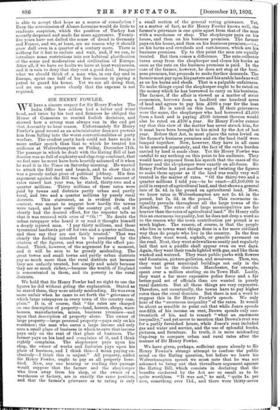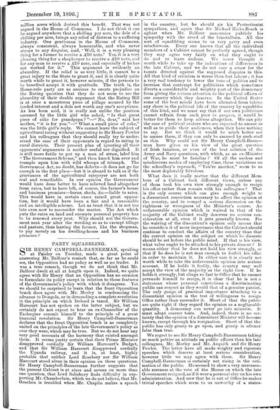SIR HENRY FOWLER.
WE have a sincere respect for Sir Henry Fowler. The India Office has seldom had a better and wiser head, and twice by his tact and firmness he obliged the House of Commons to rescind foolish decisions, and showed how a strong man always can in the end get that Assembly to hear reason. Unfortunately Sir Henry Fowler's good record as an administrator does not prevent him from falling into the worst conventionalities of party warfare. The crudest party hack could not have made a more unfair speech than that to which he treated his audience at Wolverhampton on Friday, December 11th. The passage in which he dealt with the Rating Bill of last Session was so full of sophistry and clap-trap combined, that we feel sure he must have been heartily ashamed of it when he read it in the Times on Saturday morning. He wanted to attack the Bill root and branch, and to show that it was a grossly unfair piece of political jobbery. His first argument against the Bill was this. The total amount of rates raised last year was, he stated, thirty-two and a quarter millions. Thirty millions of these rates were paid by towns and districts partly urban and partly rural, and. two and a quarter millions by purely rural districts. This statement, as is evident from the context, was meant to suggest how hardly the towns were taxed, and how easily the country got off, and it clearly bad the desired effect, for the reporter tells us that it was received with cries of " Oh ! " No doubt the urban ratepayer who heard it or read it thought himself a deeply injured man. I pay thirty millions, and those tyrannical landlords get off for two and a quarter millions, and then say they are not fairly treated.' That was clearly the feeling intended to be produced by the citation of the figures, and was probably the effect pro- duced. Think, however, of the argument for a moment, and it will be seen to be grossly misleading. The great towns and small towns and partly urban districts pay so much more than the rural districts not because they are unfairly treated, but simply and solely because they are so much richer,—because the wealth of England is concentrated in them, and its poverty in the rural districts.
We hold that Sir Henry Fowler had no right to use the figures he did without giving the explanation. Stated as be stated them, they were utterly misleading. He was even more unfair when he came to set forth the" grievance of which large ratepayers in every town of the country com- plain." It is, of course, that "the rates are charged on one description of property—land, houses, shops, ware- houses, manufactories, mines, business premises—and upon that description of property alone. The owner of large property—large personal property—pays only on his residence; the man who earns a large income and only uses a small place of business in which to earn that income pays only on the rent of that place of business. The farmer pays on his land and complains of it, and I think rightly complains. The shopkeeper pays upon his shop, the owner of works and factories pays upon his place of business, and I think this—I mean paying ex- clusively—I think this is unjust." All property, added Sir Henry Fowler, ought to pay as all property bene- fited. Now, any one hearing or reading this passage would, suppose that the farmer and the shopkeeper who lives away from his shop, or the owner of a warehouse or factory, are in exactly the same position, and that the farmer's grievance as to rating is only a small section of the general rating grievance. Yet, as a matter of fact, as Sir Henry Fowler knows well, the farmer's grievance is one quite apart from that of the man with a warehouse or shop. The shopkeeper pays on his house, and then on his business premises. The farmer pays on his house, and then on his business premises —i e 2 • •, on his barns and cowsheds and cart-houses, which are his business premises. Up to this point the men are equally treated. But then comes a difference. The rate-collector turns away from the shopkeeper and closes his books as soon as the rate on the business premises is paid. In the case of the farmer, however, he does not stop at the busi- ness premises, but proceeds to make further demands. The farmer must pay upon his pasture and his arable lands as well as on his barns and sheds. That is a palpable unfairness. To make things equal the shopkeeper ought to be rated on the money which he has borrowed to carry on his business. The farmer, if the affair is viewed as a matter of strict economics, borrows from a landlord one hundred acres of land and agrees to pay him £100 a year for the loan thereof. He is rated on this loan. If their grievances were the same, the shopkeeper who had borrowed £1,600 from a bank and is paying .Q100 interest thereon would also be rated on £100 a year. Sir Henry Fowler cannot say that this view of the matter has never struck him, for it must have been brought to his mind by the Act of last year. Before that Act, in most places the rates levied on the farmer's business premises and on the land itself were lumped together. Now, however, they have in all cases to be assessed separately, and the fact of the extra burden carried by land is made clear. Yet Sir Henry Fowler was careful to say nothing on this point to his audience. They would have supposed from his speech that the cases of the farmer and the shopkeeper were exactly on all-fours. Sir Henry Fowler had yet another way of twisting the figures to make them appear as if the land was really very well treated in the matter of rates. "Of the thirty-two and a quarter millions I told you—to be exact-00,100,000 is paid in respect of agricultural land, and that shows a general rate of 2s. 4d. in the pound on agricultural land. Now, we know rates in Wolverhampton are not 2s. 4d. in the pound, but 7s. 3d. in the pound. This enormous in- equality prevails throughout all the large towns of the Kingdom. The rates of all large municipalities are far heavier than the rates of agricultural land." Sir Henry calls this an enormous inequality, but he does not drop a word as to the reason why the town contribution per pound is so much higher. The reason, of course, is that the people who live in towns want things done in a far more civilised way than do people who live in the country. In the first place, they want wood, asphalt, or granite pavement on the road. Next, they want sidewalks so neatly and regularly laid that not a puddle shall appear even on wet days. Again, they want their roads lighted with gas, and like them washed and watered. They want public parks with flowers and fountains, picture-galleries, and museums. Then, too, they want great municipal buildings not only in the centre but in the districts. Manchester, for example, spent over a million sterling on its Town Hall. Lastly, they want a far more expensive police force and a far better-paid set of officials than are wanted in purely rural districts. But all these things are very expensive. Therefore, not unnaturally, the towns have to pay higher rates than the rural districts. But there is not a word to suggest this in Sir Henry Fowler's speech. We only hear of the "enormous inequality" of the rates. It would be about as sensible to point out that while Jones spends one-fifth of his income on rent, Brown spends only one- twentieth of his, and to remark "what an enormous inequality," and yet never to mention that Brown's rent was for a partly furnished house, while Jones's rent included gas and water and service, and the use of splendid books, pictures, and furniture. In truth, it is mere misleading clap-trap to compare urban and rural rates after the manner of Sir Henry Fowler.
We have given, perhaps, sufficient space already to Sir Henry Fowler's strange attempt to confuse the public mind on the Rating question, but before we leave his Wolverhampton speech we must note that he was not ashamed to bring out that threadbare argument against the Rating Bill, which consists in declaring that the benefits conferred by the Act are so small as to be quite worthless. "It was not," he said, "quite is. per acre, something over 11d., and there were thirty-seven million acres which derived this benefit. That was not argued in the House of Commons. I do not think it can be argued anywhere that a shilling per acre, the dole of a shilling per acre, brings any relief of distress to a suffering industry. One gentleman in the House of Commons, always consistent, always honourable, and who never stoops to any disguise, said, 'Well, it is a very pleasing thing for a farmer to receive a £10 note.' Yes, it is a very pleasing thing for a shopkeeper to receive a £10 note, and for any man to receive a £10 note, and especially if he has not worked for it." This argument is evidently an absurdity. If the relief is so very little, it cannot be a great injury to the State to grant it, and it is clearly quite worth while to grant it, however minute, if the persons to be benefited accept it with gratitude. The truth is, the Home-rule party are so anxious to create prejudice on the Rating question that they do not seem to see the absurdity of their double argument that the Rating Bill is at once a monstrous piece of pillage secured by the landed interest and a dole not worth any one's acceptance. As has been said, it is really not unlike the position assumed by the little girl who asked, "Is that great piece of cake for graudpapa ? "—" No, dear," said her mother, "it is for you."—" What a small piece of cake," was the little girl's reply. We cannot leave the subject of agricultural rating without suggesting to Sir Henry Fowler and his colleagues that they should really try to under- stand the case of their opponents in regard to rating in rural districts. Their present plan of ignoring all their opponents' arguments is neither useful nor dignified. It is still more futile to put up a man of straw, label him "The Government Scheme," and then knock him over and trample upon him with wild whoops of triumph. The Government Act, no doubt, has defects—it does not go far enough in the first place—but it is absurd to talk as if the grievances of the agricultural ratepayer are not both real and remediable. In our opinion the Government would have done better to have relieved land altogether from rates, but to have left, of course, the farmer's house and business premises—barns, sheds, &c.—liable to rates. This would have in certain cases raised great opposi- tion, but it would have been a fair and a reasonable and an intelligible scheme. Let us trust that it is not too late even now to reconsider the matter. The Act which puts the rates on land and exempts personal property has to be renewed every year. Why should not the Govern- ment next year alter the wording so as to exempt tillage and pasture, thus leaving the farmer, like the shopman, to pay merely on his dwelling-house and his business premises ?











































 Previous page
Previous page